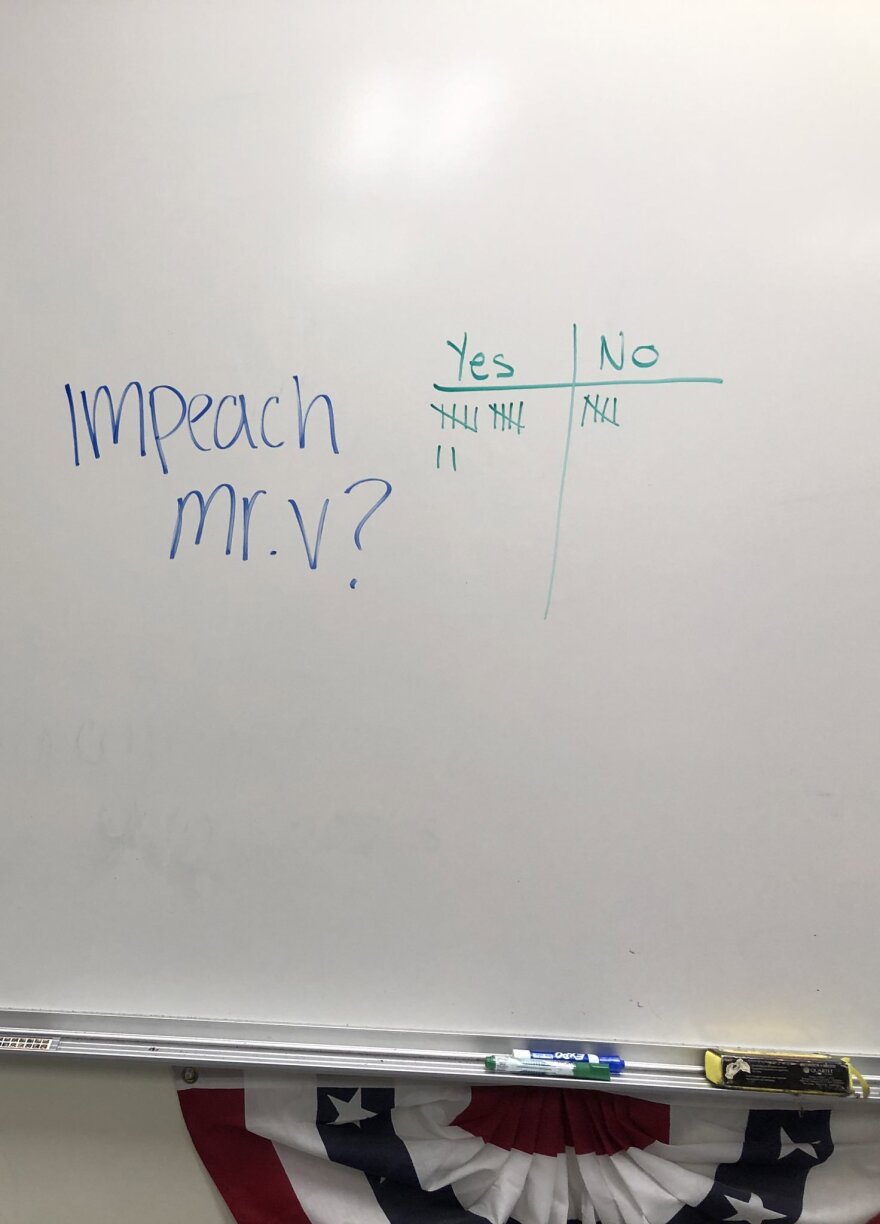Wednesday was a big day in the world of politics. The fifth Democratic debate took place in Atlanta, with 10 presidential hopefuls tackling policies and stating their case as to why they deserve America’s votes. That same day, U.S. Ambassador Gordon Sondland dropped bombshell testimony during the President Donald Trump impeachment inquiry hearings.
The morning after, high school civics teachers across the country faced the challenge of how to interpret and present those events to their students in these sometimes politically polarizing times. Naugatuck is no different; the 2016 election results were deeply divided.
At Naugatuck High, two teachers shared their approaches to covering politics, and students expressed their perspectives on current political events.
In Nicholas Varanelli’s bustling AP Government class, students worked on an assignment about impeachment, studying the constitutional guidelines for it and considering whether they would support Trump’s impeachment given the evidence presented to date. As the students worked, witnesses Fiona Hill and David Holmes testified as the impeachment inquiry hearing was projected onto the classroom whiteboard.
Varanelli said his class is “very split politically,” about 50-50 with “some real die-hards on both sides.” On social issues, he said his students lean more liberal. “But on money stuff and things like Brett Kavanaugh, they kind of swing back the other way.”
Sara Whiteley, 16, said she doesn’t “mind Trump that much, so if he ran again it wouldn’t really affect me.” She said he has done some good things and maybe some bad things, “but every president has in their own way.”
Junior Emma Messenger offered a different opinion. “There’s a lot of things that don’t sit right with me. I don’t think that he’s qualified to be president,” she said. “I don't think that somebody who’s never had experience with politics before should be the leader of our nation. As a Republican he’s more focused on business, and I like the Democratic ideal more of like, ‘let’s focus on the people and what they need and how do we serve the people as a country.’”
After watching the Democratic debate, Messenger said one of her top picks for the nominee would be Pete Buttigieg, mayor of South Bend, Indiana.
“I like Pete Buttigieg and I think it would be so cool to have an openly gay president,” she said. “I think that historically it would hold a lot of value, and what he says makes sense a lot of the time. But I don’t think he would ever win.”
For many students, a candidate who “makes sense” is appealing on a crowded, flashy debate stage, where the policies that are discussed can become convoluted for younger viewers. Even though many grasp that these policies can impact their lives, students sometimes feel they won’t have to worry about them until they’re old enough to vote.
In a civics class down the hallway from Varanelli’s class, students conducted a mock election after watching a 20-minute clip of the debate.
At first, most of the students favored reelecting Trump, but after teacher Teresa Obedzinski compared and contrasted the Democratic candidates, students settled on Buttigieg as the nominee. They then cast their ballots, and Mayor Pete received the majority of votes.
Obedzinski says her class also is politically divided. “I do think there’s definitely a split, and more so than I've seen in the last couple years. I’m trying to see where the patterns are coming from,” she said.
Obedzinski’s focus, though, is on helping students understand the issues up for debate and creating a safe space where students can form their own opinions.

“I tend to approach it as giving the students the ability to learn how to debate productively. I focus on helping them create arguments ... based on evidence, based on looking at a multitude of sources,” she said. “I try to help them learn to listen to opposing viewpoints. I try to give them ideas on how to question, how to approach each other and support their own political beliefs in that way.”
While Naugatuck High educators do their best to be neutral, insightful instructors on current events, they don’t hesitate to have a little fun.
In the middle of Varanelli’s class project on impeachment, one student decided that her teacher should be impeached. The students ended up taking a vote, and he was booted out of the classroom 12-5.
It seems that Varanelli taught his students so well, he might need to start looking for another job.




